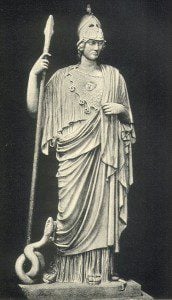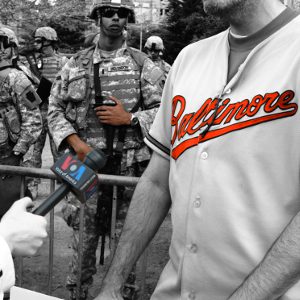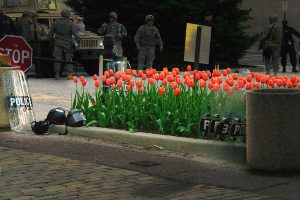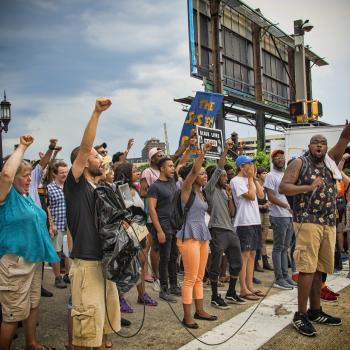Sometimes I hate being right. Months ago, I wrote
“The anger over Ferguson and these other incidents of police brutality, and over the unjust social structure that precipitates them, will not go away. Almost certainly it will be fed by fresh incidents. There will be fear and terror and horror.”
But, I didn’t think that it would hit quite so close to home so soon. I suppose that piece on wrathful deities was my Zen take on the topic of state violence; this week, my Pagan take and some Baltimorean reflections.
As a middle class white guy who has survived into his forties and whose criminal activity is pretty minor, I don’t have a lot of interaction with the police. There have been a handful of traffic tickets over the years and a few times I’ve filled out police reports on stolen property (fruitlessly). There was the time my housemate was being stalked, and I talked to the Baltimore County police as a witness and testified in court; there was also the time I was illegally stopped by the Baltimore City police while I was walking to a park that they claimed did not exist, part of the city’s harassment of the PowWow and the DIY arts scene — which is pretty small beer compared to their other crimes.

Photo credit: Kevin Labianco / Foter / CC BY-NC-ND
For those not familiar with the area, I should explain that Baltimore is the largest “independent city” in the U.S. Baltimore City and Baltimore County are entirely separate political entities, with their own governments and police forces. I grew up and currently live in Baltimore County but am somewhat active in the city’s cultural life. I’m a white kid from the suburbs and I don’t claim to speak for the people of Sandtown or any other Baltimore neighborhood; but I do understand that what happens within the city limits affects me both directly and indirectly, so I’ve been watching the problems with the Baltimore City police for years.
(Not that the County cops don’t have problems too, like breaking into a house and killing a resident in a blitzkrieg “no knock” raid in search of a suspect who wasn’t even there and who was later acquitted of the original charges against him. [Anderson; “Rasheed Standford…”] One of the invading cops was killed, and of course the mainstream media coverage has portrayed him as a hero, never mind that he was engaged in unjustified police violence and was shot by a man defending his home. Need I point out that this happened in a heavily African-American neighborhood, and that it’s very unlikely to have gone down that way on my very very white street just two miles away? One does have to wonder if the attitudes and practices of the city police filter out to their colleagues in the suburbs, or if its just the same general rot at the heart of American policing affecting both groups.)
The first time I met a Baltimore City police officer socially, I was introduced by his daughter’s boyfriend. I guess that identified me as friendly, because within few minutes that member of Baltimore’s finest was telling me about his recent arrest of a petty criminal — a purse snatcher, if I remember correctly. “And when I caught the guy,” he said, “of course I gave him one” — he pantomimed punching — “for trying to get away.” (At least that’s the best I can remember his statement twenty-some years later.) It wasn’t a reluctant admission, not something that had happened in the excitement of a physical struggle, it was a proud claim.
Honestly, if a purse snatcher had happened to get punched an extra time or three by a victim I’d hardly be troubled about it. After all, I teach people how to punch and kick and stomp people who might try to rob them. I’ve even taught basic self-defense classes at the Free Spirit Gathering and Starwood. While I teach the principle of only using the necessary and proportionate force for self-defense, if a student happened to go a tiny bit over that line I wouldn’t be inclined to judge it a sin. I might even wag my finger about it while smiling on the inside. Or, even if a police officer got a little overheated in a physical struggle and threw an extra punch or two and then acknowledged the error, I’d file it under de minimis and let it go.
But, this was a cop bragging about some deliberate “street justice” that he’d dealt out to a bad guy. Someone who was supposed to be a trained and dispassionate professional with a duty to respect the rights of a criminal suspect, but who instead administered extrajudicial physical punishment to a suspect for trying to run.
I’ve been thinking about that quite a bit these past weeks, as Baltimore deals with the killing of Freddie Gray by police after an encounter which seems to have been provoked by nothing more than Gray trying to run away from a group of cops. A group, by the way, that included one officer with a disturbing history of violence including threats of murder. [Laughland]
If you find it incredible that the Baltimore City Police Department would continue to employ a man who had made drunken threats of murder, you don’t know the BCPD. This is the force that kept Gahji Tshamba on the roster after he shot a man while drunk in 2005; he stayed a Baltimore cop until he murdered an unarmed veteran in 2010.[“Off Duty…”] BCPD cops are arrested for personal or professional charges at a rate that one researcher estimated to be eight times the national average.[Bialik]
After Gray’s death, minor violence broke out on April 25th when a protest march headed towards the baseball stadium at Camden Yards. One factor in the violence seems to have been how protesters were harassed by drunken sports fans.[Soderberg] (The rest of the city was quiet that night. I was in Station North that evening, and everyone at Joe Squared had a frustrated laugh over the exaggerated news coverage.)
The shit didn’t really hit the fan until two days later, when paranoid police overreacted to rumors of planned youth violence, shut down a public transit hub immediately after schools let out, then began to be aggressive with students. Unsurprisingly, students returned the aggression, and things spiraled out of control for the rest of the night.[Brodey]
In Baltimore, police killed Freddie Gray, and police provoked the rioting. Across the nation, we’ve seen the story of police aggression play out again and again.
Do ancient Pagan spiritual traditions have anything to say about this?

Many people don’t realize that the whole concept of a police force as we know it, as a large standing force of full-time enforcers for the state, is a recent invention. London’s Metropolitan Police Service, generally regarded as the first modern force, wasn’t established until 1829, under a plan drawn up by Sir Robert Peele.
These first modern police tried to walk a fine line between the necessary structure and discipline, and a desire to avoid being seen as an army enforcing the dictates of the government. [Balko, 29] The “Peelers” were issued a set of general instructions that included an admonishment that they were “To maintain at all times a relationship with the public that gives reality to the historic tradition that the police are the public and that the public are the police, the police being only members of the public who are paid to give full time attention to duties which are incumbent on every citizen in the interests of community welfare and existence.”[Home Office]
The first modern police force in the United States was established in New York City in 1845. These early American forces had some aspects that seem amazing today–they tried to adopt an even more democratic model than the Peelers, with police nominated by ward leaders of the neighborhood where they lived and worked, and acting more as public service agencies than law enforcers. This went to the point of the police including among their duties sheltering the homeless and feeding the hungry.
But, the “democracy” of the time was corrupted by political machines, and policing jobs became patronage positions. In the first half of the 20th century American policing moved in a more “professional” direction which isolated cops from ordinary citizens [Balko, 30-32], broke the Peelean principle the police and the public are one, and set the stage to the militarization of policing of the past few decades.
And so policing as we know it is too new for any traditional pantheons or mythologies to address directly. But there are more general lessons about violence, aggression, and defense that can be applied.
One such lesson is found in the contrast between the two ancient Greek deities of war: Athena and Ares.
Athena, goddess of wisdom, was not only full-grown but fully armed and armored when she sprang from the head of Zeus. Called “valiant in war” by Homer, she was the tutelary deity of Athens and second only to her father in the devotions of that city-state. Classicist Jane Harrison notes that “The rising democracy took the ancient figure of the local Korê and set her as rival and counterpoise to Poseidon, the old god of the aristocracy;” [Harrison, 16] her origins seem to be tied to those of democracy itself. She was not only a warrior but a jurist, known for her sense of justice; also the inventor of weaving. She taught humanity how to make not just such useful mechanisms as sails, the plow, the axe, and the wheel, but also the flute and the trumpet.[Gibson, 56] Truly she was and is a goddess of many sorts of craft and creativity, and when she fights, it is to protect that which has been created.

Compare her with Ares, the aggressive bringer of death not only in war but in famine and pestilence, the thoughtless destroyer of whom Harrison says “He is splendid and forceful, but never really respected….Ares is a god, but he is unhonoured by the orthodox gods, the Olympians.” [Harrison, 40] In sharp contrast to Athena — and all too reminiscent of American police today — Ares was known for his lack of good judgment and his disregard of justice. At various times he finds himself humiliated by Hephaestus and by Otus and Ephialtes, the sons of Poseidon.
Every time Ares and Athena opposed each other–including during the Trojan War, one of the defining events of Ancient Greek civilization–it was Ares who lost.[Gibson, 41-42] The lesson of the myths is clear: aggression leads to failure; it falls to wisdom.
It’s not entirely accurate to see the Greek and Roman gods as equivalent, as we sometimes do in discussing classical mythology. As Padraic Colum wrote,
It is important to separate the Greek and Latin mythologies: Iuppiter, though akin to, is not the same as Zeus; Iuno is not the same as Hera. Minerva is not the same as Athena, Neptune is not the same as Poseidon. “The Romans worshipped not gods, not dei,” writes Miss Jane Harrison, “but powers, numina”:
These numina were only dim images of activities. They had no attributes, no life histories; in a word, no mythology.[Colum, xv]

But with that warning in mind, it’s noteworthy that where the Greeks had an almost disdainful attitude toward Ares, the Romans had Mars as the central figure of their worship[Colum, xv], claiming him as the father of their founders Romulus and Remus.[Colum, 107-108]
And, given the American Founding Fathers fondness for Rome, their preference for a Republic that ended in Empire over the original Democracy, perhaps we see here one of the faults at the very heart of our nation.
Aggression and brutality in the fashion of Ares have marked our foreign policy since the late 19th century. And that came home starting with the Nixon administration and coming into full flower with the Reagan era — the birth-time of so many of our contemporary national ills. It was Reagan’s Attorney General, William French Smith, who said that “The Justice Department is not a domestic agency. It is the internal arm of the national defense.”[Balko, 139] We have here the American government bringing the brutality of war fully and consciously and deliberately into our law enforcement.
Our society is too much Aresian and too little Athenian. We are too ready to give in to the easy mindless rage that ends in defeat and humiliation for the aggressor and destruction for their victims, rather than the difficult, judicious, creative — but still valiant and strong — way of wisdom. The problem is not merely political: it reaches to the deep spiritual level of how we see our relation with ourselves and the world.
But in the history of policing, in those Peelean principles and in the early American police who took care of citizens in need, we can see another way, one that follows the democratic maiden Athena.

References
Anderson, Jessica. “Family member criticizes raid that killed Balto. Co. officer, relative.” The Baltimore Sun. 29 Jan 2014. <http://articles.baltimoresun.com/2014-01-29/news/bs-md-co-rasheed-stanford-20140129_1_rasheed-stanford-officer-jason-schneider-tevon-smith>
Balko, Radley. Rise of the Warrior Cop : the militarization of America’s police forces. New York: PublicAffairs, 2013.
Bialik, Carl. “Baltimore’s Police Officers Have Been Arrested At High Rates.” FiveThirtyEight. <http://fivethirtyeight.com/datalab/baltimores-police-officers-have-been-arrested-at-high-rates/>
Brodey, Sam and Jenna McLaughlin. “Eyewitnesses: The Baltimore Riots Didn’t Start the Way You Think.” Mother Jones. 28 Apr 2015. <http://www.motherjones.com/politics/2015/04/how-baltimore-riots-began-mondawmin-purge>
Colum, Padraic. Orpheus: Myths of the World. New York: Macmillan, 1930. <http://www.sacred-texts.com/etc/omw/index.htm>
Gibson, Michael, and Giovanni Caselli. Gods, men & monsters from the Greek myths. New York: P. Bedrick, 1991.
Harrison, Jane. Myths of Greece and Rome. New York: Doubleday, Doran & Company, 1928. <http://www.sacred-texts.com/cla/mgr/index.htm>
Home Office [UK]. “Policing by consent.” GOV.UK. 10 Dec 2012. <https://www.gov.uk/government/publications/policing-by-consent>
Laughland, Oliver and Jon Swaine. “Baltimore police officer who chased Freddie Gray had pattern of violence – court filings.” The Guardian. 23 Apr 2015. <http://www.theguardian.com/us-news/2015/apr/23/baltimore-officer-who-chased-freddie-gray-had-pattern-of-violence-court-filings>
“Off-Duty Officer Fatally Shoots Unarmed Marine.” WBALTV. 7 Jun 2010. <http://www.wbaltv.com/Off-Duty-Officer-Fatally-Shoots-Unarmed-Marine/8927622>
“Rasheed Standford found not guilty in officer’s death.” WBALTV. 23 May 2014. <http://www.wbaltv.com/news/rasheed-standford-found-not-guilty-in-officers-death/26120334>
Soderberg, Brandon. “How drunk sports fans helped spark Saturday night’s post-protest violence.” City Paper [Baltimore]. 28 Apr 2015. <http://www.citypaper.com/bcpnews-how-drunk-sports-fans-helped-spark-saturday-nights-violence-20150428,0,75331.story>
“The Zen Pagan” appears every other Friday…for now. Changes are afoot! Watch this space! You can keep up by subscribing via RSS or e-mail.
My next scheduled events are the Free Spirit Gathering in June and Starwood in July.
If you do Facebook, you might choose to join a group on “Zen Paganism” I’ve set up there. And don’t forget to “like” Patheos Pagan over there, too.

















